高中生英语写作中英汉文化差异困境与对策论文
英语作文中西文化差异
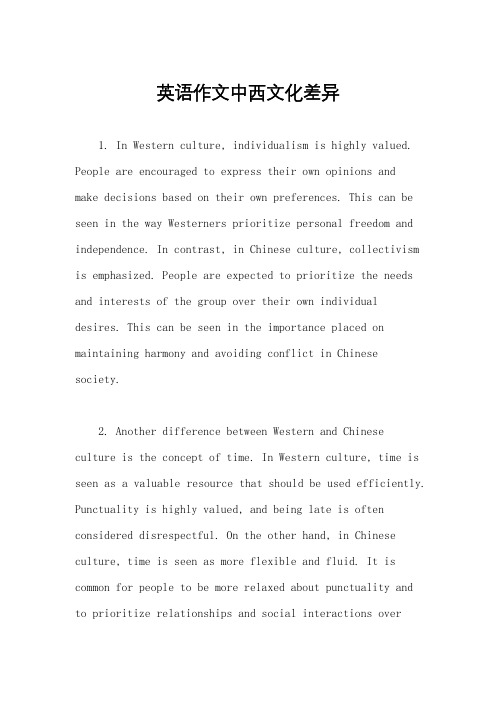
英语作文中西文化差异1. In Western culture, individualism is highly valued. People are encouraged to express their own opinions and make decisions based on their own preferences. This can be seen in the way Westerners prioritize personal freedom and independence. In contrast, in Chinese culture, collectivism is emphasized. People are expected to prioritize the needs and interests of the group over their own individual desires. This can be seen in the importance placed on maintaining harmony and avoiding conflict in Chinese society.2. Another difference between Western and Chineseculture is the concept of time. In Western culture, time is seen as a valuable resource that should be used efficiently. Punctuality is highly valued, and being late is often considered disrespectful. On the other hand, in Chinese culture, time is seen as more flexible and fluid. It is common for people to be more relaxed about punctuality andto prioritize relationships and social interactions overstrict adherence to schedules.3. The way emotions are expressed also differs between Western and Chinese culture. In Western culture, it is common for people to openly express their emotions, both positive and negative. It is seen as healthy and authentic to share one's feelings with others. In contrast, in Chinese culture, there is a greater emphasis on maintaining harmony and saving face. It is considered more appropriate to suppress or control one's emotions, especially negative ones, in order to avoid causing discomfort or embarrassment to oneself or others.4. The concept of personal space is another area where Western and Chinese culture differ. In Western culture, personal space is highly valued and people tend to maintain a certain distance from others, especially strangers. Invading someone's personal space is seen as intrusive and disrespectful. In Chinese culture, personal space is not as strongly emphasized. People are often comfortable standing closer to each other and physical contact, such as touching someone's arm during a conversation, is more common andaccepted.5. Finally, the role of religion and spirituality differs between Western and Chinese culture. In Western culture, there is a greater emphasis on individual spirituality and personal beliefs. People have the freedom to choose their own religious or spiritual path and often express their beliefs openly. In Chinese culture, religion is often more intertwined with traditional customs and practices. There is a greater emphasis on ancestral worship and following established rituals and traditions.。
中英文化差异方面论题作文
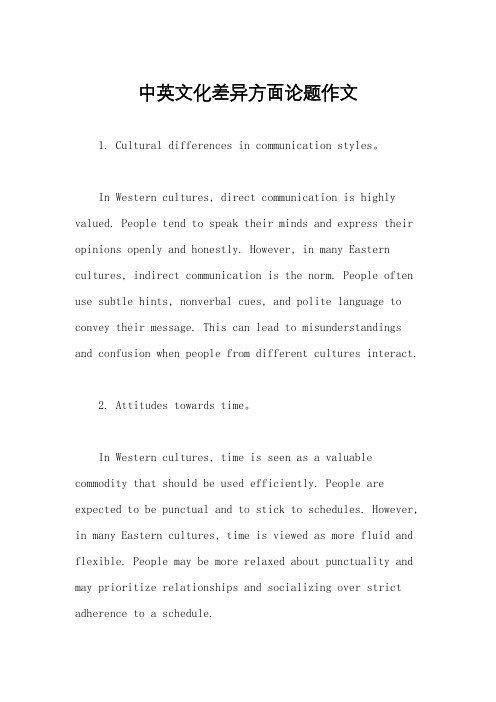
中英文化差异方面论题作文1. Cultural differences in communication styles。
In Western cultures, direct communication is highly valued. People tend to speak their minds and express their opinions openly and honestly. However, in many Eastern cultures, indirect communication is the norm. People often use subtle hints, nonverbal cues, and polite language to convey their message. This can lead to misunderstandings and confusion when people from different cultures interact.2. Attitudes towards time。
In Western cultures, time is seen as a valuable commodity that should be used efficiently. People are expected to be punctual and to stick to schedules. However, in many Eastern cultures, time is viewed as more fluid and flexible. People may be more relaxed about punctuality and may prioritize relationships and socializing over strict adherence to a schedule.3. Concepts of individualism vs collectivism。
中英文化的文学差异作文

中英文化的文学差异作文英文:When it comes to the cultural differences between Chinese and English literature, there are several key points to consider. First of all, the language itself plays a significant role in shaping the literary styles of both cultures. Chinese literature is known for its rich use of symbolism and imagery, while English literature tends to focus more on direct and concise expression. For example,in Chinese poetry, a lot of attention is paid to the use of metaphors and allusions, which can create layers of meaning and evoke deep emotions. On the other hand, English poetry often relies on straightforward language and clear imagery to convey its message.Another important difference lies in the themes and subject matters that are commonly explored in Chinese and English literature. In Chinese literature, there is a strong emphasis on tradition, history, and the moral valuesof society. Many classic Chinese novels and poems are centered around the themes of filial piety, loyalty, and the pursuit of wisdom. On the other hand, Englishliterature often delves into individualism, personal struggles, and the complexities of human relationships. For instance, while Chinese literature may focus on the collective experience of a family or a community, English literature may zoom in on the inner conflicts and desires of a single character.Furthermore, the cultural and societal contexts in which Chinese and English literature are produced also contribute to their differences. Chinese literature is deeply influenced by the Confucian philosophy and the historical events of ancient China, which can be seen in the emphasis on moral lessons and the portrayal of social hierarchy. In contrast, English literature reflects the values and ideologies of Western civilization, often exploring themes of freedom, individual rights, and the pursuit of happiness.中文:当谈到中英文化的文学差异时,有几个关键点需要考虑。
中西方差异的英语作文
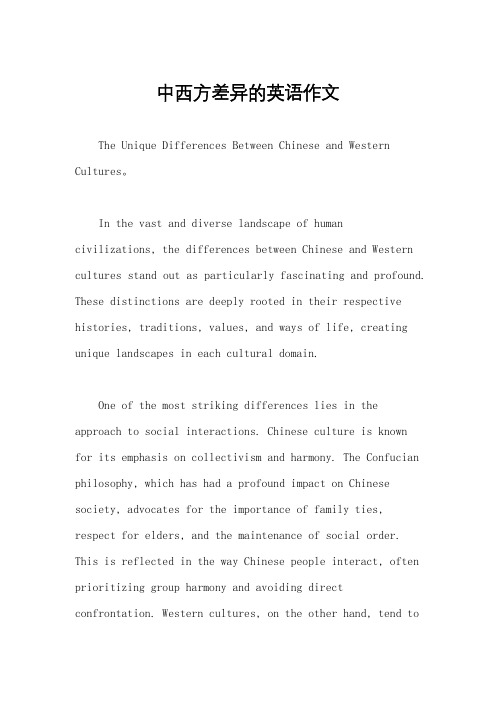
中西方差异的英语作文The Unique Differences Between Chinese and Western Cultures。
In the vast and diverse landscape of humancivilizations, the differences between Chinese and Western cultures stand out as particularly fascinating and profound. These distinctions are deeply rooted in their respective histories, traditions, values, and ways of life, creating unique landscapes in each cultural domain.One of the most striking differences lies in the approach to social interactions. Chinese culture is knownfor its emphasis on collectivism and harmony. The Confucian philosophy, which has had a profound impact on Chinese society, advocates for the importance of family ties, respect for elders, and the maintenance of social order. This is reflected in the way Chinese people interact, often prioritizing group harmony and avoiding direct confrontation. Western cultures, on the other hand, tend tovalue individualism and self-expression. People are encouraged to voice their opinions freely, pursue their personal goals, and celebrate their differences. This independent spirit fosters a more competitive environment, where self-assertion and personal achievement are highly valued.Another significant difference is in the realm of communication styles. Chinese communication is often characterized by indirectness and subtlety. People tend to avoid direct confrontation and prefer to convey messages in a roundabout manner, often leaving room for interpretation. This is due to the importance of maintaining social harmony and avoiding embarrassment. Western communication, on the other hand, tends to be more direct and explicit. People are encouraged to express their thoughts and feelings openly, without fear of causing offense. This directness can sometimes lead to misunderstandings, but it alsofosters a culture of honesty and transparency.The differences in values and beliefs between Chinese and Western。
中西文化差异冲突的对策和建议英语作文
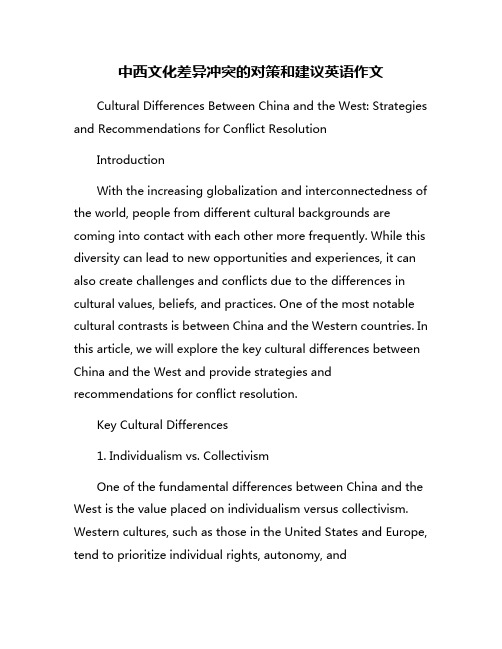
中西文化差异冲突的对策和建议英语作文Cultural Differences Between China and the West: Strategies and Recommendations for Conflict ResolutionIntroductionWith the increasing globalization and interconnectedness of the world, people from different cultural backgrounds are coming into contact with each other more frequently. While this diversity can lead to new opportunities and experiences, it can also create challenges and conflicts due to the differences in cultural values, beliefs, and practices. One of the most notable cultural contrasts is between China and the Western countries. In this article, we will explore the key cultural differences between China and the West and provide strategies and recommendations for conflict resolution.Key Cultural Differences1. Individualism vs. CollectivismOne of the fundamental differences between China and the West is the value placed on individualism versus collectivism. Western cultures, such as those in the United States and Europe, tend to prioritize individual rights, autonomy, andself-expression. In contrast, Chinese culture emphasizes the importance of the group and the harmony of society.2. Communication StyleChinese communication tends to be more indirect and implicit, with a focus on preserving face and maintaining harmonious relationships. Western communication, on the other hand, is more direct and explicit, with an emphasis on clarity and efficiency.3. Concept of TimeWestern cultures typically place a high value on punctuality and efficiency, with time seen as a limited resource that must be managed effectively. In contrast, Chinese culture values flexibility and adaptability, with time seen as fluid and malleable.4. Hierarchical vs. EgalitarianChinese society tends to be more hierarchical, with a clear emphasis on status and rank. Western societies, on the other hand, are more egalitarian, with a focus on equality and meritocracy.Strategies for Conflict Resolution1. Cultural Awareness and SensitivityThe first step in resolving conflicts between Chinese and Western cultures is to develop a deeper understanding of the cultural differences and how they impact communication, behavior, and relationships. By increasing cultural awareness and sensitivity, individuals can avoid misunderstandings and bridge the gap between the two cultures.2. Effective CommunicationEffective communication is essential for resolving conflicts in any cultural context. In the case of Chinese-Western interactions, it is important to strike a balance between directness and indirectness, taking into account the cultural preferences of each party. Clear and open communication, combined with active listening and empathy, can help prevent misunderstandings and build trust.3. Respect and EmpathyRespect for cultural differences and empathy for the perspectives of others are crucial for conflict resolution. Instead of imposing one's own cultural norms and values on others, individuals should strive to understand and appreciate the cultural context of the other party. By showing respect and empathy, conflicts can be de-escalated and mutual understanding can be fostered.Recommendations for Conflict Resolution1. Seek Common GroundDespite the differences between Chinese and Western cultures, there are also shared values and goals that can serve as a basis for collaboration and conflict resolution. By identifying and focusing on common ground, such as mutual respect, trust, and cooperation, individuals can overcome cultural barriers and work towards a resolution.2. Collaborative Problem-SolvingCollaborative problem-solving is an effective approach for resolving conflicts between different cultures. By engaging in open and transparent dialogue, exploring multiple perspectives, and seeking win-win solutions, individuals can address underlying issues and build sustainable relationships. In the case of Chinese-Western conflicts, a collaborative approach can help bridge the cultural divide and promote mutual understanding.3. Third-Party MediationIn cases where conflicts between Chinese and Western cultures cannot be resolved through direct communication, third-party mediation can be a valuable option. A neutral mediator with expertise in cross-cultural communication canhelp facilitate dialogue, clarify misunderstandings, and guide the parties towards a mutually acceptable resolution. By involving a mediator, individuals can overcome cultural barriers and reach a sustainable agreement.ConclusionConflicts between Chinese and Western cultures are inevitable in the globalized world. By recognizing the key cultural differences, developing strategies for conflict resolution, and implementing recommendations for mutual understanding, individuals can navigate these cultural divides and build harmonious relationships. With cultural awareness, effective communication, respect, empathy, and collaborativeproblem-solving, conflicts can be resolved, and bridges can be built between China and the West.。
英汉语篇中的文化差异与英语写作论文
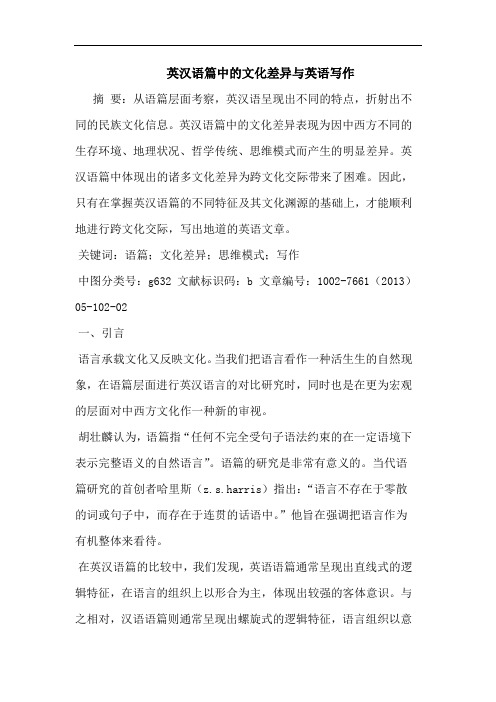
英汉语篇中的文化差异与英语写作摘要:从语篇层面考察,英汉语呈现出不同的特点,折射出不同的民族文化信息。
英汉语篇中的文化差异表现为因中西方不同的生存环境、地理状况、哲学传统、思维模式而产生的明显差异。
英汉语篇中体现出的诸多文化差异为跨文化交际带来了困难。
因此,只有在掌握英汉语篇的不同特征及其文化渊源的基础上,才能顺利地进行跨文化交际,写出地道的英语文章。
关键词:语篇;文化差异;思维模式;写作中图分类号:g632 文献标识码:b 文章编号:1002-7661(2013)05-102-02一、引言语言承载文化又反映文化。
当我们把语言看作一种活生生的自然现象,在语篇层面进行英汉语言的对比研究时,同时也是在更为宏观的层面对中西方文化作一种新的审视。
胡壮麟认为,语篇指“任何不完全受句子语法约束的在一定语境下表示完整语义的自然语言”。
语篇的研究是非常有意义的。
当代语篇研究的首创者哈里斯(z.s.harris)指出:“语言不存在于零散的词或句子中,而存在于连贯的话语中。
”他旨在强调把语言作为有机整体来看待。
在英汉语篇的比较中,我们发现,英语语篇通常呈现出直线式的逻辑特征,在语言的组织上以形合为主,体现出较强的客体意识。
与之相对,汉语语篇则通常呈现出螺旋式的逻辑特征,语言组织以意合为主,体现出较强的主体意识。
我们认为这与中西方文化模式与思维模式上的差异有着密切联系。
本文试图借助功能语言学与语用学的理论,对英汉语篇中的文化差异与英语写作作一些探索。
二、英汉语篇差异及其文化成因之探讨1、直线形结构与螺旋形结构英语段落的发展呈典型的直线形,段落中的意思以有秩序的顺序清晰地相互联系它往往先陈述段落的中心意思,然后分点说明。
在展开中心意思的过程中,段落中的每一个句子都自然地从每一个前面的句子中产生,已叙述过的内容不会再加以重复。
从而使语篇具有了一种流动的感觉,即在原先意思表达的基础上不断向深入和高峰方向发展的感觉。
例如:①we can read of things that happened 5,000 years ago in the near east, where people first learned to write. ②but there are some parts of the world where even now people cannot write.③the only way that they can preserve their history is to recount it as sagas—legends handed down from one generation of storytellers to another. ④these legends are useful because they can tell us something about migrations of people who lived long ago, but none could write down what they did.⑤anthropologists wondered where the remote ancestors of the polynesian peoples now living in the pacific islands came from.⑥the sagas of these people explain that some of them came from indonesia about 2,000 years ago.上述段落的发展模式为:①→②③→④{⑤⑥}。
中英文化差异英语作文
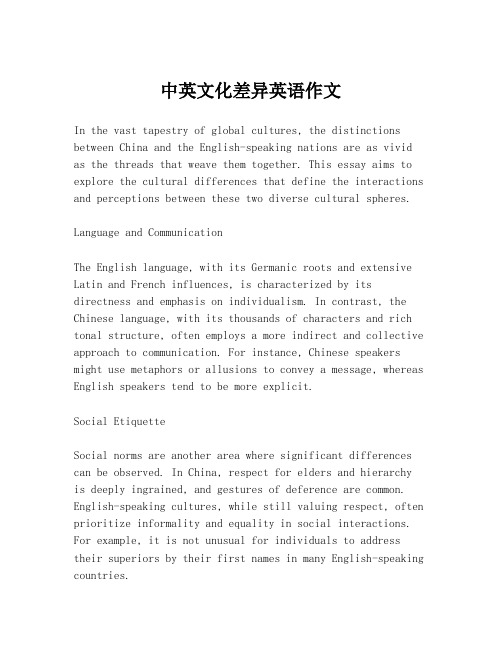
中英文化差异英语作文In the vast tapestry of global cultures, the distinctions between China and the English-speaking nations are as vivid as the threads that weave them together. This essay aims to explore the cultural differences that define the interactions and perceptions between these two diverse cultural spheres.Language and CommunicationThe English language, with its Germanic roots and extensive Latin and French influences, is characterized by its directness and emphasis on individualism. In contrast, the Chinese language, with its thousands of characters and rich tonal structure, often employs a more indirect and collective approach to communication. For instance, Chinese speakers might use metaphors or allusions to convey a message, whereas English speakers tend to be more explicit.Social EtiquetteSocial norms are another area where significant differences can be observed. In China, respect for elders and hierarchyis deeply ingrained, and gestures of deference are common. English-speaking cultures, while still valuing respect, often prioritize informality and equality in social interactions. For example, it is not unusual for individuals to address their superiors by their first names in many English-speaking countries.Family ValuesFamily is central to both cultures, but the dynamics can differ. Chinese culture places a strong emphasis on familial obligations and the importance of maintaining harmony within the family unit. In English-speaking cultures, while familyis also important, there is often a greater focus on individual autonomy and personal achievement.Educational ApproachesEducation is highly valued in both China and English-speaking countries, but the methodologies can vary significantly. Chinese education tends to be more exam-oriented and competitive, with a strong focus on rote memorization and academic rigor. English-speaking countries often adopt a more student-centered approach, encouraging critical thinking and creative problem-solving.Workplace DynamicsThe workplace is another arena where cultural differences manifest. Chinese businesses often operate within a hierarchical structure where decisions are made at the top and filtered down. In contrast, many English-speakingcultures promote a flatter organizational structure that encourages collaboration and input from all levels of the organization.Cultural AdaptabilityUnderstanding these cultural differences is crucial for effective communication and collaboration in our increasingly globalized world. It is important to approach these differences with an open mind and a willingness to learn and adapt. Cultural sensitivity and respect are key to navigating the complexities of cross-cultural interactions.In conclusion, while the Chinese and English-speakingcultures share common values such as the importance of family and education, their approaches to communication, social etiquette, and personal relationships are distinct. Recognizing and respecting these differences can lead to more harmonious and productive exchanges between these diverse cultural groups.。
浅析高中英语写作中的中式英语问题及解决方法
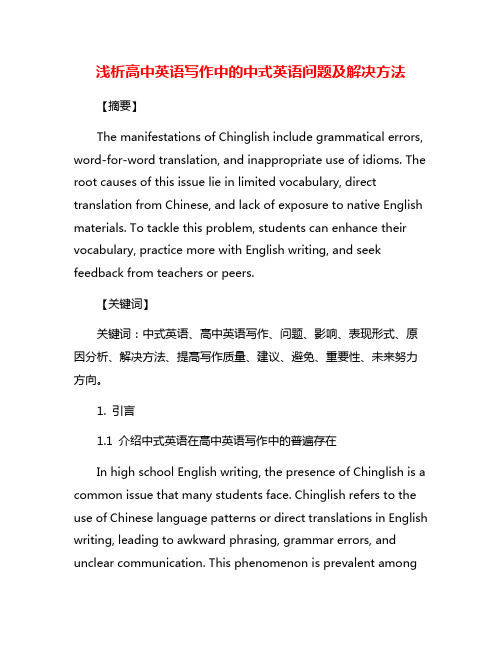
浅析高中英语写作中的中式英语问题及解决方法【摘要】The manifestations of Chinglish include grammatical errors, word-for-word translation, and inappropriate use of idioms. The root causes of this issue lie in limited vocabulary, direct translation from Chinese, and lack of exposure to native English materials. To tackle this problem, students can enhance their vocabulary, practice more with English writing, and seek feedback from teachers or peers.【关键词】关键词:中式英语、高中英语写作、问题、影响、表现形式、原因分析、解决方法、提高写作质量、建议、避免、重要性、未来努力方向。
1. 引言1.1 介绍中式英语在高中英语写作中的普遍存在In high school English writing, the presence of Chinglish is a common issue that many students face. Chinglish refers to the use of Chinese language patterns or direct translations in English writing, leading to awkward phrasing, grammar errors, and unclear communication. This phenomenon is prevalent amonghigh school students who are not yet proficient in English and often rely on direct translations from Chinese to English.1.2 分析中式英语问题对写作质量的影响When it comes to high school English writing, the issue of Chinglish, or Chinese-style English, is a prevalent problem that significantly impacts the quality of students' writing. Chinglish refers to the incorrect or awkward use of English language structures, vocabulary, and idioms that result from direct translation from Chinese. This phenomenon not only hinders the clarity and coherence of the writing but also reflects a lack of proficiency in English language skills.2. 正文2.1 中式英语问题的表现形式1. 词汇选择不当:学生常常会直译中文词汇或短语,导致用词不准确或使用别扭。
中西文化差异和英语写作论文

中西文化差异和英语写作论文中西文化差异对英语写作的影响学习语言不仅要学习其发音规则、语法内容,更重要的是要体会其所含有的文化底蕴,如果不能够将自己的思想与语言的表达习惯融会贯通,那么即使积累词汇再多、语法学的再精通,在写作之时也会给人一种蹩脚的感觉,终归无法融入到此门语言之中来,导致写作毫无亮点可言。
由于中西方文化差异,导致中国学生在使用英语写作之时在语言运用、思维方式、表达方式、内容与结构的安排等方面都受到不同程度的影响。
1语言使用上面的差异对英语写作的影响。
从文化的根源上面讲,中文和英文在使用上存在本质的区别,两者是截然不同的两种语言,前者属于分析、意合型,后者则属于综合、形合型。
一些在英语中普遍存在的语言现象,在汉语中却少之又少甚至根本不存在。
这样就会使一些基础不是很好的学生在学习英语时不自觉的将汉语的使用习惯拿到英语中来,在选词造句甚至修辞等方面都是从母语中直接“借”来用的,如此一来,英语写作怎么能体现出水平呢?2思维方式迥异对英语写作的影响。
文化与语言之间其实是有一条连接的纽带的,它就是思维模式。
语言是思维的工具,相反的,思维同时也决定了语言的表达形式,因此说,中西方人思维上的差异同时也影响着学生们用英语进行写作的效果。
举个例子说,在汉语中表达某地点的时候,我们习惯从小到大的讲,例如“蓝天宾馆502号房间”,而同样的意义,英语中则会从小到大的进行表达,译为“Room502,LantianHotel”。
类似这样的由于思维方式不同而影响语言表达顺序的还表现在记录时间方面,汉语中通常用“年、月、日”的顺序进行表达,例如“2012年5月23日”,但是在英语中却需要按照“日、月、年”的顺序进行书写,书写为“23th,May,2012”。
此外,由于西方人的思维属于直线型,所以他们在表达时习惯开门见山,将重点放在最前面,这与含蓄委婉的中国式表达又形成了鲜明的对比。
中国学生在写作的时候容易进入误区,不能将重点或者文章的主旨放在开头最显眼的地方,令英语写作水平止步不前。
英汉两种语言和文化的差异英语作文
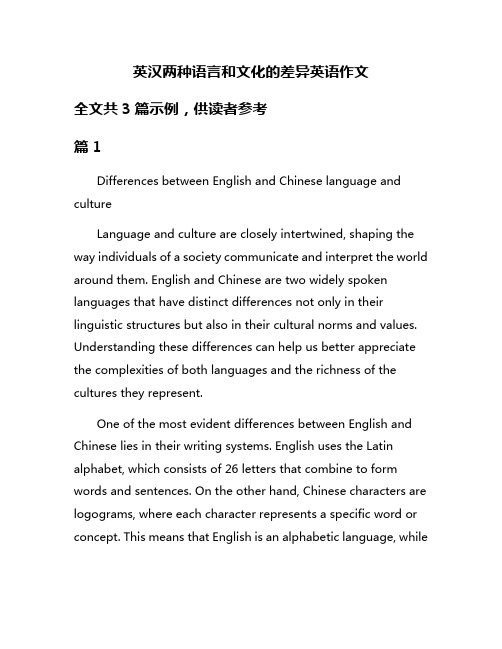
英汉两种语言和文化的差异英语作文全文共3篇示例,供读者参考篇1Differences between English and Chinese language and cultureLanguage and culture are closely intertwined, shaping the way individuals of a society communicate and interpret the world around them. English and Chinese are two widely spoken languages that have distinct differences not only in their linguistic structures but also in their cultural norms and values. Understanding these differences can help us better appreciate the complexities of both languages and the richness of the cultures they represent.One of the most evident differences between English and Chinese lies in their writing systems. English uses the Latin alphabet, which consists of 26 letters that combine to form words and sentences. On the other hand, Chinese characters are logograms, where each character represents a specific word or concept. This means that English is an alphabetic language, whileChinese is logographic, which influences the way speakers of each language process information and express themselves.Another key difference between English and Chinese is the grammatical structure. English has a subject-verb-object (SVO) word order, where the subject typically comes before the verb and the object after the verb. In contrast, Chinese has asubject-object-verb (SOV) word order, where the subject precedes the object and the verb comes last. This structural difference can lead to misunderstandings and confusion when speakers of one language attempt to translate into the other.Cultural differences also play a significant role in shaping the languages of English and Chinese. English-speaking culturestend to value individualism, independence, and direct communication. This is reflected in the English language, which places a strong emphasis on the use of personal pronouns and straightforward expressions. In contrast, Chinese culture values collectivism, harmony, and indirect communication. Chinese speakers are more likely to use honorifics and polite language to show respect and maintain social harmony.The concept of “face” is another cultural difference that influences the w ay languages are used. In Chinese culture, “face” refers to one's social standing and reputation, which must bemaintained and protected at all costs. This concept is reflected in the Chinese language through the use of polite forms of address and deferential language when speaking to elders or authority figures. In English-speaking cultures, “face” is less emphasized, and individuals are more likely to express their opinions and emotions openly.Food and dining customs are another area where English and Chinese cultures diverge. English cuisine is diverse and often includes meat dishes, dairy products, and baked goods. Meals are typically served in courses, with each dish highlighted for its flavors and textures. In contrast, Chinese cuisine tends to be more communal, with dishes served family-style and shared among diners. Chinese food often features rice or noodles as staples, along with a variety of vegetables, tofu, and meats cooked in flavorful sauces.In conclusion, the differences between English and Chinese language and culture are vast and varied, reflecting the unique histories, values, and customs of each society. By understanding and appreciating these differences, we can develop a greater sense of cultural awareness and empathy towards others. Language and culture are dynamic and ever-changing, and it is essential to approach them with an open mind and a willingnessto learn. Only then can we truly bridge the divide between different languages and cultures and foster mutual understanding and respect.篇2Differences Between English and Chinese Language and CultureLanguage and culture are deeply intertwined aspects of human society. Comparing English and Chinese, two vastly different languages and cultures, can offer valuable insights into the way people communicate, think, and view the world. In this essay, we will explore the differences between English and Chinese language and culture, focusing on various aspects such as grammar, vocabulary, writing systems, and cultural values.Grammar Differences:One of the significant differences between English and Chinese lies in their grammatical structures. English is an alphabetic language, with a subject-verb-object word order. It uses tenses, articles, and plural forms to convey precise meanings. In contrast, Chinese is a logographic language, with a subject-predicate-object word order. It uses tones, particles, and classifier words to convey nuances of meaning. For example,while English uses plural forms like 's' or 'es' to indicate multiple objects, Chinese uses measure words to count specific objects.Vocabulary Differences:English and Chinese also have different vocabularies due to their unique historical and cultural backgrounds. English has a rich blend of words borrowed from various languages, such as Latin, French, and German. Chinese, on the other hand, has a vast number of characters representing meanings, ideas, and concepts. While English has fewer characters, Chinese has a complex system of radicals, strokes, and character components. This leads to differences in word formation, syllable structure, and pronunciation.Writing System Differences:Another key distinction between English and Chinese is their writing systems. English uses the Latin alphabet, with 26 letters and a set of rules for spelling and pronunciation. Chinese uses characters, with thousands of symbols representing words, phrases, and idioms. Each Chinese character has its own unique stroke order, radical position, and pronunciation. Learning to write Chinese characters requires memorization, practice, and repetition, unlike English letters, which can be learned through phonics and sounds.Cultural Values Differences:English and Chinese cultures also have different values, beliefs, and practices that influence language use and communication styles. English-speaking countries often prioritize individualism, autonomy, and self-expression. In contrast, Chinese-speaking countries prioritize collectivism, harmony, and social relationships. This leads to differences in tone, politeness, and indirectness in communication. For example, English speakers may use direct language to express opinions, while Chinese speakers may use indirect language to avoid conflict.In conclusion, the differences between English and Chinese language and culture are vast and complex, reflecting the unique histories, traditions, and worldviews of their respective societies. Understanding these differences can help bridge communication gaps, foster intercultural understanding, and promotecross-cultural exchange. By appreciating the richness and diversity of both languages and cultures, we can enhance our global awareness, empathy, and respect for one another.篇3Differences between English and Chinese Language and CultureLanguage and culture are two inseparable elements that shape the identity of a group of people. When comparing English and Chinese, two of the world's most widely spoken languages, it becomes evident that their differences go beyond vocabulary and grammar. These differences reflect the unique cultural backgrounds of the speakers and have a profound impact on how communication is conducted between them. In this essay, we will discuss some of the key differences between English and Chinese language and culture.One of the most striking differences between English and Chinese is the writing system. English uses an alphabet system with 26 letters, while Chinese uses characters that represent words or syllables. This fundamental difference in writing systems also reflects the different ways in which these languages are structured. English is a phonetic language, meaning that the sounds of the words are represented by letters, while Chinese is a logographic language, where characters represent meanings.Another key difference between English and Chinese is the use of tones in Chinese. In Chinese, the meaning of a word can change depending on the tone in which it is spoken. There arefour tones in Mandarin Chinese (five in some dialects), and mastering these tones is essential for effective communication. In contrast, English does not use tones to differentiate meanings, relying instead on stress and intonation for emphasis.Cultural differences also play a significant role in shaping the languages and communication styles of English and Chinese speakers. For example, Chinese culture places a strong emphasis on hierarchy and respect for authority. This is reflected in the use of honorifics and formal language forms when addressing superiors or elders. In contrast, English-speaking cultures tend to be more egalitarian, with a greater emphasis on individualism and informality in communication.Another cultural difference between English and Chinese is the concept of face. In Chinese culture, maintaining harmony and saving face are important considerations in communication. This can manifest in indirect communication styles and the use of euphemisms to avoid causing offense. In English-speaking cultures, directness and honesty are often valued in communication, even if it means risking conflict or confrontation.Food culture is another area where English and Chinese cultures diverge. Chinese cuisine is known for its diverse flavors and use of fresh ingredients, with an emphasis on balance andharmony. Meals are often shared family-style, with a variety of dishes served at once. In contrast, English cuisine is more traditional and less diverse, with a focus on meat and potatoes. Meals are typically served in courses, with individual portions for each diner.These are just a few examples of the differences between English and Chinese language and culture. While these differences can sometimes lead to misunderstandings and challenges in communication, they also provide opportunities for cross-cultural learning and appreciation. By understanding and respecting the unique qualities of each language and culture, we can foster greater understanding and cooperation between speakers of English and Chinese.。
中英文化的文学差异作文
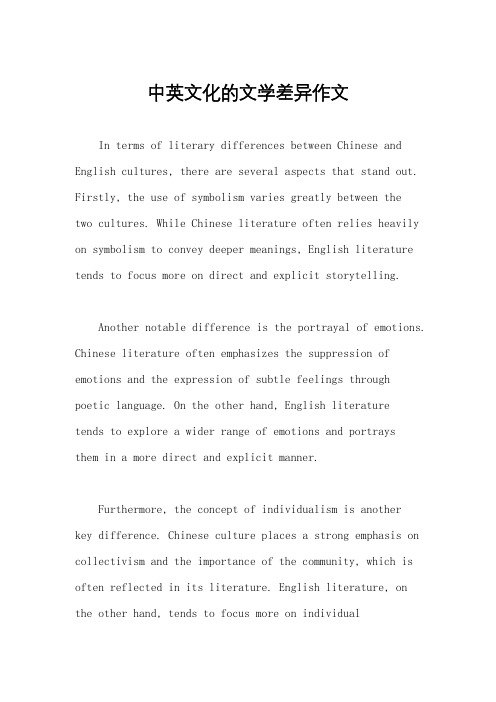
中英文化的文学差异作文In terms of literary differences between Chinese and English cultures, there are several aspects that stand out. Firstly, the use of symbolism varies greatly between thetwo cultures. While Chinese literature often relies heavily on symbolism to convey deeper meanings, English literature tends to focus more on direct and explicit storytelling.Another notable difference is the portrayal of emotions. Chinese literature often emphasizes the suppression of emotions and the expression of subtle feelings throughpoetic language. On the other hand, English literaturetends to explore a wider range of emotions and portraysthem in a more direct and explicit manner.Furthermore, the concept of individualism is anotherkey difference. Chinese culture places a strong emphasis on collectivism and the importance of the community, which is often reflected in its literature. English literature, on the other hand, tends to focus more on individualexperiences and the exploration of personal identity.In terms of narrative structure, Chinese literature often follows a circular or cyclical pattern, where the story ends where it begins. This reflects the Chinesebelief in the interconnectedness of all things. English literature, on the other hand, tends to follow a linear narrative structure, with a clear beginning, middle, and end.Moreover, the use of metaphors and similes also differs between the two cultures. Chinese literature often employs extended metaphors and elaborate similes to create vivid and poetic descriptions. English literature, on the other hand, tends to use more straightforward metaphors and similes that are easily understandable.Additionally, the use of dialogue in literature also differs. Chinese literature often uses indirect andimplicit dialogue to convey meaning, while Englishliterature tends to use more direct and explicit dialogue.Lastly, the role of nature in literature is another notable difference. Chinese literature often portraysnature as a harmonious and integral part of human existence, with a focus on the interconnectedness between humans andthe natural world. English literature, on the other hand, often portrays nature as a separate entity, with a focus on the individual's relationship with nature.In conclusion, the literary differences between Chinese and English cultures are evident in various aspects such as the use of symbolism, portrayal of emotions, concept of individualism, narrative structure, use of metaphors and similes, dialogue, and the role of nature. Thesedifferences reflect the unique cultural values and perspectives of each society, and contribute to therichness and diversity of world literature.。
高中英语翻译中的文化差异与翻译处理

高中英语翻译中的文化差异与翻译处理在全球化的今天,英语作为一种国际语言,被广泛应用于各个领域。
而在高中英语教学中,翻译也是一个重要的环节。
然而,由于不同国家和地区的文化差异,翻译过程中常常会遇到一些困难和挑战。
本文将探讨高中英语翻译中的文化差异与翻译处理的问题。
首先,文化差异是翻译中不可忽视的因素之一。
不同国家和地区的文化背景、历史传统以及社会习俗都会影响到人们对语言的理解和运用。
因此,在进行高中英语翻译时,我们需要充分考虑目标语言所处的文化环境。
例如,英语中的一些习语、成语和俚语在不同的文化背景下可能会有不同的解释和使用方式。
这就要求译者具备丰富的跨文化素养,能够准确地把握源语言和目标语言之间的文化差异,以便进行恰当的翻译处理。
其次,翻译中的文化差异还涉及到价值观和观念的差异。
不同的文化对于某些概念和价值的理解可能存在差异,这就给翻译带来了一定的挑战。
例如,英语中的“freedom”一词在不同的文化中可能有不同的涵义和重要性。
在一些西方国家,自由被视为一项重要的价值观和权利,而在一些东方国家,社会稳定和集体利益可能更受重视。
因此,在翻译中,译者需要根据不同的文化背景和读者的需求,合理地选择和调整词语和表达方式,以确保翻译结果能够准确传达源语言的意思,并且符合目标语言的文化价值观。
此外,语言的语法和结构也可能因为文化差异而不同。
英语和中文在语法和句法结构上存在一定的差异,这就要求译者在进行高中英语翻译时要注意语言的表达方式和语法规则。
例如,英语中的被动语态在中文中往往需要通过其他方式来表达。
又如,在中文中,修饰词往往放在被修饰词的前面,而在英语中则相反。
因此,译者需要根据目标语言的语法规则和表达习惯,进行适当的调整和转换,以确保翻译的准确性和流畅性。
最后,翻译中的文化差异还涉及到习俗和礼仪的差异。
不同国家和地区的人们在社交、礼仪和风俗习惯上可能存在差异。
因此,在进行高中英语翻译时,译者需要了解并尊重不同文化背景下的习俗和礼仪规范,以避免因为翻译不当而引起误解或冒犯。
中英文化差异作文600字
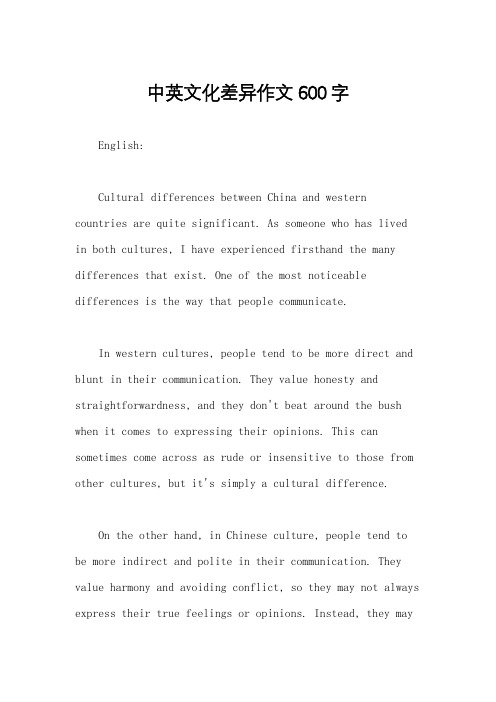
中英文化差异作文600字English:Cultural differences between China and western countries are quite significant. As someone who has livedin both cultures, I have experienced firsthand the many differences that exist. One of the most noticeable differences is the way that people communicate.In western cultures, people tend to be more direct and blunt in their communication. They value honesty and straightforwardness, and they don't beat around the bush when it comes to expressing their opinions. This can sometimes come across as rude or insensitive to those from other cultures, but it's simply a cultural difference.On the other hand, in Chinese culture, people tend to be more indirect and polite in their communication. They value harmony and avoiding conflict, so they may not always express their true feelings or opinions. Instead, they mayuse subtle hints or gestures to convey their message. This can sometimes be frustrating for westerners who are used to more direct communication.For example, in a business meeting, a westerner may say something like "I don't think that idea will work becauseit's too expensive." In contrast, a Chinese person may say something like "That's an interesting idea, but perhaps we could explore some other options as well." The Chinese person may not directly express their opinion about the idea being too expensive, but they are still conveyingtheir message in a polite and indirect way.Another example is in social situations. In western cultures, it's common to ask personal questions such as "What do you do for a living?" or "Are you married?" However, in Chinese culture, these types of questions may be considered too personal and intrusive. Instead, people may talk about more general topics such as the weather or current events.中文:中西方文化差异相当显著。
关于文华差异的英语作文高中

Cultural Differences: A Perspective from aHigh School StudentIn today's interconnected world, cultural differences are more apparent than ever. As a high school student, I have had the opportunity to encounter and understand various cultures through school activities, travels, and interactions with people from diverse backgrounds. This experience has not only broadened my horizons but also taught me the importance of respecting and embracing cultural differences.Firstly, the differences in customs and traditions are a striking aspect of cultural diversity. For instance, in some cultures, greeting someone with a handshake is customary, while in others, a bow or a kiss on the cheek is preferred. Similarly, dietary habits and festivals vary widely across cultures. In some parts of the world, rice is a staple food, while in others, wheat-based dishes are more common. These differences reflect the unique history, geography, and way of life of each culture.Moreover, language is a powerful tool that reflects cultural differences. Different languages have their uniquevocabulary, grammar, and expressions that shape the way people think and communicate. Learning a new language not only helps us understand a culture better but also broadens our cognitive abilities. It allows us to appreciate the subtleties and nuances of different ways of thinking and expressing ideas.However, the existence of cultural differences does not mean that one culture is superior to another. Each culture has its strengths and weaknesses, and it is essential to appreciate the uniqueness of each culture while respecting its values and beliefs. It is through mutual understanding and respect that we can build bridges of friendship and cooperation across cultures.As a high school student, I believe that it is crucial to be aware of and sensitive to cultural differences. We should strive to be culturally literate and informed, so we can navigate the increasingly globalized world with confidence and respect. By understanding and embracing cultural diversity, we can create a more inclusive and harmonious society where everyone feels valued and respected.In conclusion, cultural differences are an integralpart of our world's rich tapestry. As high school students, we have the responsibility to appreciate, respect, andlearn from these differences. By doing so, we can become more tolerant, understanding, and globally aware individuals, contributing to a more interconnected and peaceful world.**文化差异:高中生的视角**在当今这个互联互通的世界,文化差异比以往任何时候都更加明显。
高中英语作文中西文化差异_高中英语作文_
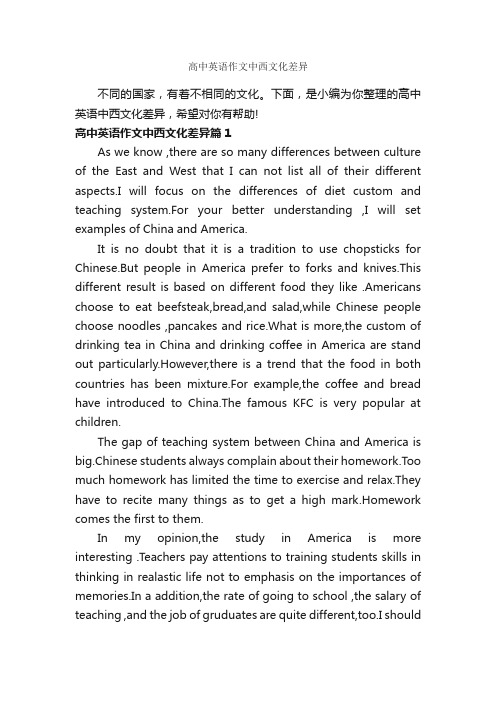
高中英语作文中西文化差异不同的国家,有着不相同的文化。
下面,是小编为你整理的高中英语中西文化差异,希望对你有帮助!高中英语作文中西文化差异篇1As we know ,there are so many differences between culture of the East and West that I can not list all of their different aspects.I will focus on the differences of diet custom and teaching system.For your better understanding ,I will set examples of China and America.It is no doubt that it is a tradition to use chopsticks for Chinese.But people in America prefer to forks and knives.This different result is based on different food they like .Americans choose to eat beefsteak,bread,and salad,while Chinese people choose noodles ,pancakes and rice.What is more,the custom of drinking tea in China and drinking coffee in America are stand out particularly.However,there is a trend that the food in both countries has been mixture.For example,the coffee and bread have introduced to China.The famous KFC is very popular at children.The gap of teaching system between China and America is big.Chinese students always complain about their homework.Too much homework has limited the time to exercise and relax.They have to recite many things as to get a high mark.Homework comes the first to them.In my opinion,the study in America is more interesting .Teachers pay attentions to training students skills in thinking in realastic life not to emphasis on the importances of memories.In a addition,the rate of going to school ,the salary of teaching ,and the job of gruduates are quite different,too.I shouldsay that Chima government should make great efforts to improve its teaching syetem.I am also expect to be one day ,the West give more cheersto our country.高中英语作文中西文化差异篇2Through I am a Chinese,I have some west country friends.They lived in China for many years, from their tone ,I know that there are many cultural difference between West and China.Such as difference of dinner manners……In west countries ,when people are having dinner ,if one of them want to go to a WC.He or she shoud say”Exc use me ,I want to go to the toilets…”Only in such a way can others think you are of good manners.And in the bathroom,you can relieve the bowels, wash you faces, refine the make-up ,pick your teeth and so on.When you finished yourself,you can return to you set.A wonderful dinner can be continue.But in China,there are some different of it.When you want to have a bath,you shoud only say”I want to go to washroom”.That just means:I want to go out for a while.If you finished you dinner ,you can also say:”I'm full”That means:I am full ,help youselves.And then ,you can go out to have a rest or walk.That just some of the difference of dinner manners in west and in China.When we face it in the future ,don`t forget that! 高中英语作文中西文化差异篇3There are many difference between China and America such as in the field of geography ,culture, language ,politics ,economy and education with the development of science and technology .The word get even more smaller ,the communication between them is more frequent . Our country, China absorbs the essence and doesn’t eliminate the bad thing . Because a proverb ever since said when the fresh air come in ,the flies will also accompany it . At times we may not determine our countries’geography and culture . But the system of politics economy , especially family education can be decided by the individuals . As the main body of the education is parents’ child . Though each parent tries their best and strives to teach their children very well, there are still some problems in it . In order to ta ckle them, I’ll give some detailed analysis of the difference of family education between China and American.。
中西文化的差异英语作文

中西文化的差异英语作文The differences between Chinese and Western culturesare quite significant. In China, family values andtraditions play a huge role in people's lives. Respect for elders and authority is deeply ingrained in the culture,and people are expected to adhere to strict social norms.On the other hand, in Western cultures, individualism and personal freedom are highly valued. People are encouraged to express their opinions and pursue their own goals, even if it means going against societal expectations.In terms of communication, Chinese people tend to be more indirect and reserved in their speech, often using subtle cues and nonverbal communication to convey their thoughts and feelings. In contrast, Westerners aregenerally more direct and outspoken, preferring to communicate their thoughts and feelings openly.When it comes to food, Chinese cuisine is known for itsdiverse flavors and use of fresh ingredients. Meals areoften shared family-style, and there is a strong emphasison balance and harmony in the dishes. In the West, there is a wide variety of cuisines influenced by different cultures, and individual portions are more common.In terms of social etiquette, the concept of "saving face" is important in Chinese culture, and people are often careful not to cause embarrassment or loss of dignity for themselves or others. In Western cultures, there is less emphasis on this concept, and people are generally moreopen to discussing and addressing issues openly.Overall, the differences between Chinese and Western cultures are vast and complex, and understanding and appreciating these differences can lead to greater cultural awareness and mutual respect.。
浅析中西方文化差异与英语翻译论文

浅析中西方文化差异与英语翻译论文无论是在学习还是在工作中,大家都经常接触到论文吧,通过论文写作可以培养我们独立思考和创新的能力。
相信很多朋友都对写论文感到非常苦恼吧,下面是店铺精心整理的浅析中西方文化差异与英语翻译论文,欢迎大家借鉴与参考,希望对大家有所帮助!浅析中西方文化差异与英语翻译论文篇1摘要:翻译的本质是两种文化的交流。
文化的差异是一个译者必须要处理好的问题,如果处理不当就容易让读者产生歧义。
分析了中西方主要的文化差异,并对主要的差异进行了举例说明。
介绍了对于这种差异的基本翻译方法,它们分别是:异化法、归化法和音译法。
并对这些方法进行了解释。
关键词:文化差异;处理方法;异化法;归化法;音译法1、语言是社会的产物,是人类历史和文化的结晶它凝聚着一个民族世代相传的社会意识,历史文化,风俗习惯等各方面人类社会所有的特征。
不同的文化需要沟通。
沟通离不开翻译,可见文化及其交流是翻译发生的本源,翻译是文化交流的产物。
翻译教学和研究的经验表明:翻译理论和技巧必须建立在不同语言和文化的对比分析的基础上。
翻译之所以困难,归根结底是语言差异和文化差异。
英汉两种语言在表达方式上有相似之处,但2012年02月13日09时09分,《英语学习:英语论文:简析中西方文化差异与英语翻译[1]》由出国英语编辑整理。
2、译法汉语文化中特有的事物在英语文化中完全空缺,这时可采用音译法将具有特殊文化内涵的词语“移植”到英语文化中去。
如:“功夫”kong fu、“乌龙茶”oolong等。
许多采用音译法翻译的词语已成为英语中的外来词,被西方大众广泛接受。
3、结语语言是文化的一部分,也是文化的传承者。
文化依靠语言进行传播、交流。
东西方文化的差异对英汉互译产生了深远的影响。
因此对于译者来说熟悉中英两种文化甚至比掌握这两种语言更为重要。
翻译离不开文化,没有基于文化的翻译是达不到交流的目的的。
本文只列举了三种基本的翻译方法,对于文化意象处理的问题,并没有统一的翻译方法和公式,译者应根据上下文灵活处理。
中西方文化差异的英语作文

中西方文化差异的英语作文In the vast tapestry of human civilization, the cultural differences between the East and the West have always been a subject of fascination and study. This essay aims to explore the distinct cultural characteristics of China and theWestern world, highlighting the contrasts and similaritiesthat define our global community.Language and CommunicationThe Chinese language, with its tonal nature and pictographic script, is a stark contrast to the phonetic alphabets used in Western languages. Communication in China often relies on subtlety and implicit meaning, where the context and tone can convey a message as much as the words themselves. In contrast, Western communication tends to be more direct and explicit, with a focus on clarity and straightforward expression.Family ValuesFamily is a central pillar in both Eastern and Western societies, yet the approach to family values differs significantly. In China, there is a strong emphasis onrespect for elders and the concept of filial piety, where children are expected to care for their parents in their old age. Western cultures, while also valuing family, tend to promote independence from a younger age, with lessexpectation of children to provide for their parents.EducationEducation is highly valued in both cultures, but the educational systems and philosophies are quite different. Chinese education is often characterized by a rigorous and competitive approach, with a strong focus on rote learning and academic achievement. Western education, on the other hand, tends to prioritize creativity, critical thinking, and a more holistic approach to learning.Religion and PhilosophyReligion plays a different role in the cultural fabric of the East and West. In China, a syncretic blend of Confucianism, Taoism, and Buddhism has shaped the cultural ethos, with an emphasis on harmony, balance, and moral conduct. The West has been largely influenced by Christianity, with a focus on individualism, personal salvation, and moral codes derived from religious texts.Food and CuisineFood is not just sustenance but a reflection of culture. Chinese cuisine is renowned for its diversity, with an emphasis on flavor, texture, and balance. Meals are often shared, symbolizing community and togetherness. Western cuisine, particularly in the United States, is characterized by individual portions, with a wide variety of flavors and dishes influenced by immigration and globalization.Work EthicThe work ethic in the East is often described as industrious and disciplined, with a strong emphasis on dedication and long hours. In contrast, the West tends to value a balance between work and personal life, with a focus on efficiencyand productivity within a more regulated work schedule.Celebrations and FestivalsFestivals and celebrations are integral to both cultures, but they manifest in different ways. Chinese festivals like the Spring Festival (Chinese New Year) and the Mid-AutumnFestival are steeped in tradition and family reunions. Western holidays such as Christmas and Thanksgiving also emphasize family and togetherness but are often accompanied by distinct religious or historical narratives.In conclusion, while the cultures of the East and West share the common threads of humanity, they are woven together in unique and distinct patterns. Understanding these differences enriches our global dialogue and fosters a deeper appreciation for the diversity that makes our world sovibrant and complex.。
中西方文化差异英语论文

中西方文化差异英语论文A Comparative study on school education in America and China Abstract:In American, education attract great attention from the government, compulsory education is 12 years, 3 years longer than ours, the students not only enjoy free books but even havefree lunch, from this you can see how American care about education.What is more, most of the people will not get satisfiedwith 12 years education, if so, they can hardly get a job.Many of them will go for further study.They study more forwardly and more self-conscious, and these two kinds of good behavior also bring a good social atmosphere.Chinese teachers are used to divide students in different level based on they marks in the exam, and students will be divided into different classes.While American teachers prefer touse "ABCD" instead of Arabic numerals to evaluate the students,in their eyes every student is good, so teachers will not grudge praise for the students, maybe appreciative education is enlightened from this.Body:As we all know, there are lots of differences in school education between China and America. Now I want to talk about the differences from primary education to higher education.The reasons why I want to compare this two kinds of education style are very simple. First, if we want to learn about a country we should learn its education style to learn about how they cultivate the next generation. Second, we can learn other's advantages and improve ours, especially for we developing countries. Third, development of society always rely on science, and science come from education, if we want to be strong, education is the very key.You may ask why the differences exist, yeah, why? In my opinion, differences come so obviously because we have quite different thinking methods, we Chinese prefer to summarize experience after every practice, and we are good at applying our summary into practice. While Americans are used to doing some practice first, they can achieve a lot in these practice. In other words our thinking method is limited in the elder generation's experience seriously, what we do is to apply these summary into application, it will do great harm to our innovation. Now let us compare our different kind of education style from primary education to higher education between the two countries.1.Primary School EducationIt's so common that our children suffer lots of homework after class, what is more, the young have to attend to every kind of extra class to improve their scores, we have to admire that our children grasp betterbasic knowledge, however, what we lose is far more than what we gain. As is the time should we have a reflection, we put so heavy pressure on the young, but it does not work well, children ought to have a happy childhood.While, children in American have less classes and less homework, teachers prefer to let the young do more activities not exercise they want them to consider more and achieve the interest during their practice. Teachers often let children have free talks to train speaking skills, so today we can see Americans do better in arguing.During primary education, their students mainly study math and language, teachers usually arrange some activities which need to be finished in group, it not only improve the young's friendship but also do good to their sense of a teamwork. We can see the US children have quite relaxed growing environment. They have a more comfortable childhood I think.2.High School EducationI am willing to talk more about this part as this period impressed me so much.In Chinese high school, we study for three years, during this period, students have a lot of things to do, most of which is about study, every day we are preparing for college entrance examination, we all want to make good scores and choose an idealcollege, so you can imagine this three-year career is a great challenge for us.Everyday, we begin our class from 7:00 to 12:00 in the morning and from 2:00 till 5:30 in the afternoon, during a day's study, we mainly have math, physic, chemistry, biology, English and Chinese classes, these are the very subjects we should prepare for college entrance examination. We also have some interesting classes. Each week we have two PE classes, during this time we can do what sports we love and we can also relax ourselves, in my opinion only two PE classes are really not enough for us. We have two psychology classes, in this class teacher will show us some exciting topics that have something to do with us, it really help us a lot when we feel lost and frustrated. In Art class teacher will show us famous pictures and tell us the story of each work, we feel quite relaxed at this moment as we can have a sleep or do some other things. Though study is essential during these three years, yet what is the most important I think is that we develop great friendship during high school life, and our friendship is so pure that we can trust each other without any hesitation. Though these three years is the busiest period, it really give us an valuable memory.When we come to American high school, we can see that they have a relaxed study life.As is seen,their high school life isvery similar to our college life, they commonly study for four years during high school, they need not to pay too much attention to college entrance examination,in American, people prefer your ability than your scores, so students work hard to improve their all kinds of abilities. They go to class from 7:30 to 2:15 from Monday to Friday and only six classes every day, maybe you do not believe,but it is really true. They also have more interesting classes such as pottery class, theatre class and legal class, what the school want is to strengthen students's practical skills. American students go to class in different classroom while we Chinese have permanent classroom, what is more, they are free to develop themselves and major in the subjects they like. As long as they get enough credits they can get graduated, so we can conclude that their style is like our college style.And our class atmosphere is also different, Chinese students should sit rightly and answer the teacher's question carefully, we consider that shows our respect to our teacher, however, American students prefer to sit as comfortable as they feel, they think it is good for study efficiency.3.College EducationIn this part we will continue to introduce the difference between two kinds of education styles.In China, having entranced college, students finally have the chance to lead a relaxed life after so many years study life. Many of them pursuit not to fail in every term's final examination, considering that is enough. And after these four years, students both can get a job and go for further study, it mainly depend on your personal desire. In the four year's life we have to get enough credits to get graduated, we need to attend to required courses and elective subjects. In college you may not go to every class, it is so common that every student have ever escaped from classes. And during these four years we can join all kinds of organizations and that is a good way to improve our communication skills and we can meet more people, maybe one or more among them will do us a favor in the future. We also take part in many kinds of national examinations, among which are CET4, CET6, and NCRE2. If you get the certificate. It will help you a lot when you attend a job interview after graduation.Now let us have a look at American college life. In the front of this article we know their students have a very relaxed life as they do not need to worry about entering college, they can go to college though their score is poor, of course, if you want to choose famous college you should have good scores.After American students entering college, many of them begin to work harderthan they ever did, they may stay in the library all day long, they think it is time for their effort, or they will not get satisfied job after graduation.And on the way I want to say something not so important. In China a student can go to famous university as long as he have good social relationship, and he will get a gradual certificate. While if you study in America, you should pay attention, getting in by the back door is impossible, if you do not work hard you will never graduate successfully, and no satisfied job is waiting for you.In general, Chinese education style pays more attention to basic knowledge, especially to math physic and chemistry.Our students really have steady basic knowledge that the US students admire very much. When we turn to see US students, we can easily find they prefer to improve social skills, including arguing, social work and teamwork, this difference lead to a phenomenon that if Chinese and American both work in a company most of the Americans will work as manager, and most of we Chinese will work as technical staff who work for the manager.When asked what bring this difference, American say "Chinese have very good knowledge standard but they are not willing to talk about their opinions in meetings, they are used to work along with formerexperience and lack innovation spirit."Conlusion:different education systemIn China the majority of young people will get the opportunity to enjoy the 9 years' mandatory education, and very few people can go to high school or college, so the proportion of people get educated to the whole people is quite low. The reason why our government puts so many efforts to encourage the young to get further study is mainly to improve our nation's quality.That is the whole content I want to share with you to learn the difference between American and Chinese school education, we can see that we really have a lot of things to solve in our education, why our people can not get Nobel prize, maybe there is something wrong with our education system. What we should do is to learn other's advantages and decrease the gap. Maybe years later our students will get the world's attention.。
中西文化的差异高中生英语作文
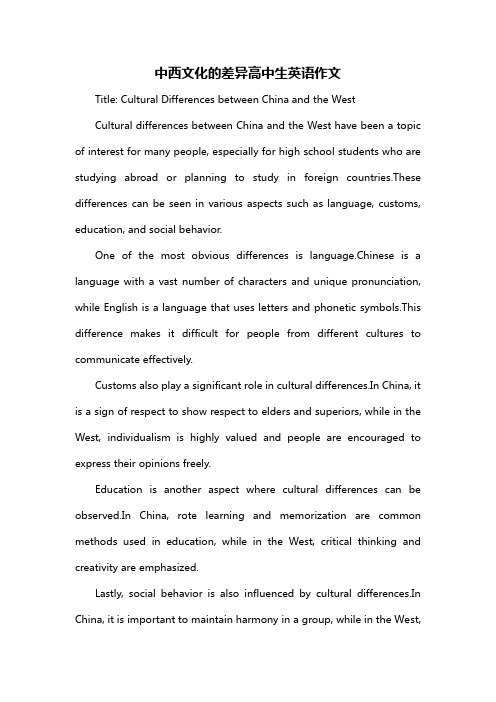
中西文化的差异高中生英语作文Title: Cultural Differences between China and the WestCultural differences between China and the West have been a topic of interest for many people, especially for high school students who are studying abroad or planning to study in foreign countries.These differences can be seen in various aspects such as language, customs, education, and social behavior.One of the most obvious differences is language.Chinese is a language with a vast number of characters and unique pronunciation, while English is a language that uses letters and phonetic symbols.This difference makes it difficult for people from different cultures to communicate effectively.Customs also play a significant role in cultural differences.In China, it is a sign of respect to show respect to elders and superiors, while in the West, individualism is highly valued and people are encouraged to express their opinions freely.Education is another aspect where cultural differences can be observed.In China, rote learning and memorization are common methods used in education, while in the West, critical thinking and creativity are emphasized.Lastly, social behavior is also influenced by cultural differences.In China, it is important to maintain harmony in a group, while in the West,individual achievements are highly valued.In conclusion, cultural differences between China and the West exist in various aspects such as language, customs, education, and social behavior.Understanding and respecting these differences is important for effective communication and cooperation between people from different cultures.As high school students, it is essential for us to learn about different cultures and develop a global perspective.。
- 1、下载文档前请自行甄别文档内容的完整性,平台不提供额外的编辑、内容补充、找答案等附加服务。
- 2、"仅部分预览"的文档,不可在线预览部分如存在完整性等问题,可反馈申请退款(可完整预览的文档不适用该条件!)。
- 3、如文档侵犯您的权益,请联系客服反馈,我们会尽快为您处理(人工客服工作时间:9:00-18:30)。
高中生英语写作中英汉文化差异困境与对策
《普通高中英语课程标准(实验)》明确提出了高中阶段的英语教学要着重提高学生用英语获取信息、处理信息、分析问题和解决问题的能力,特别注重提高学生用英语进行思维和表达的能力,形成跨文化交际的意识和基本的跨文化交际能力。
每一个社会文化的交流都拥有自己的思维模式、价值观念、风俗和生活方式。
中国学生用英语写作很容易受汉语思维和习惯表达的影响而种种写出不符合英语表达习惯的句子。
如果学生不了解英汉文化之间的差异,就不可能写出真正的英语作文。
一、英汉文化差异困境在语言形式中的体现
汉语和英语是两种截然不同的语言符号系统,它们的差异具体反映在词汇、句子(习惯用语)和篇章等方面。
学生在英语写作中往往受汉语思维的影响,套用汉语的用法,从而导致chinglish的出现屡见不鲜。
1 词汇方面的差异(1)词性的差异。
英语的每一个词在进入句子之前都有明确的词性,即使同性词也要分为可数名词与不可数名词,及物动词与不及物动词,表语性形容词与定语性形容词等等。
由于受汉语的影响,学生对英语的词性把握相对缺乏严谨性,往往只注意词义而忽略了词性,造成许多语言错误。
例如:
he treats his wife bad.(将形容词bad误用为副词)
we are againsting the plan.(将介词against误用为动词)it is probable not right.(将形容词probable误用为副词)
(2)词汇的虚与实。
汉语的思维是整体综合的,而英语的思维是分析,独特的。
表现在语言上,汉语往往偏好种概念的词,即泛指,用词概括而模糊;英语偏好属概念的词,即特指,用词具体而细腻。
比如汉语中“吃饭”一词,在英语中就有have breakfast,have lunch,have supper,havedinner and have a meal等多种表达法。
(3)词汇的空缺。
一种语言里的有些词在另一种语言里没有对等或契合的词,这种现象叫“词汇空缺”。
例如:英语中的american dream(美图梦),指美国标榜的立国精神——人人自由和机会均等;halfway house(中途的房子),指康复医院;water—gate(水门事件),泛指类似“水门事件”的丑闻等等。
这些词在汉语中是找不到对应词的,同样,反映汉语民族文化的事物或概念的词汇,在英语中也存在着空缺,如“风水”、“楷书”、“红包”、“有喜”“、红喜”、“白喜”等等。
(4)词语的搭配。
英语词语搭配是我国学生学英语的难点之一。
比如许多学生习惯于把“学习知识说成“learnknowledge”,显然这是错误的,正确的表达应为acquireknowledge。
英语中通常与knowledge搭配的动词有acquire,obtain,develop,enlarge,gain等。
有些学生会将“看书”译成see a book(see应改为read),将“天黑了”译成it isblack(black应改为dark)。
2 句法方面的差异
汉语与英语在句子结构方面最基本的差异是:汉语句子重意合,
英语句子重形合,还具体表现在句子的结构、句子的词序,以及句子的时态和语态上。
(1)句子的形合与意合。
英语注意运用各种有形的连接手段,以达到语法形式的完整,其表现形式严密地受逻辑形式的支配,一般都有一个明确的中心,不论句子中的附加成分多么复杂,总与中心成分保持清楚的逻辑关系。
例如:after he finished his job,he went out of his office to have a cupof tea。
(他做完工作,走出办公室,喝杯茶)一见到after,两句间的逻辑关系便很清楚了。
(2)句子的结构。
一般来说,汉语句子的主语可以很长,而英语句子的主语尽可能的简洁,以使句子结构保持平衡。
学生因忽略这一差异而出现语言错误。
如:在这种恶劣的天气里找点吃的是很困难的,学生通常会译为:to findsomething to eat in such a wretched weather is very difficult.
(3)句子的词序。
英语叙述和说明事物时,习惯于从小到大,从特殊到一般,从个体到整体;汉语的顺序一般则是从大到小,从一般到特殊,从整体到个体,突出表现在多项定语和多项状语的位置顺序上。
例如:我们游览了中国的三个美丽城市。
i toured china’s three beautiful cities按照英语习惯表达应该写成:i toured three beautiful chinese cities。
(4)句子的时态。
英语不仅有时态,而且种类繁多(共有16种时态),区分细微,习惯性强。
英语就是通过这些固定的语法手段
将动作的进行过程与状况描绘得更准确,更精细,有时甚至能表达说话人的感情色彩。
例如:you arealways complaining that to me。
你总是向我抱怨那件事。
(用现在进行时表示厌烦的感情色彩)(5)句子的语态。
汉语中被动语态很少使用,即使使用了,大多也含有贬义,如“被批评”“挨刀”等。
但是英语中被动语态使用频率很高。
由于不习惯用被动语态,学生在写作中常会出现类似这样的错误:会议正在讨论阻止污染的问题。
the meeting is discussing the problem of preventing pollution。
正确的英语表达应为:the problem of preventing pollution isbeing discussed at the meeting。
二、提高写作能力的对策
1 建立增强学生的文化敏感性。
在英语学习方面,鼓励学生发现文化现象和文化内涵,比较英汉两种文化中,增强对英汉两种文化的敏感性。
2 帮助学生掌握写作技巧。
教师可以引导学生进行一些写作技巧方面的训练,帮助学生掌握技巧,灵活处理写作中遇到的各种问题。
例如,在写作中使用回避策略,可以有效地化解英汉文化的差异。
3 加强写作与听、说、读、译的联系。
平时的学习中要加强翻译的练习,通过翻译练习和教师的批改,可以及时找到学生写作方面的弱点,并指出和纠正,通过听、说、读、译,逐渐地培养学生用英语进行思维的能力,以改进写作。
